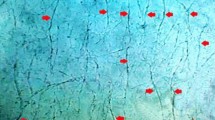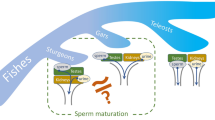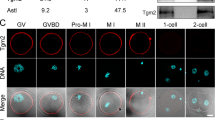Abstract
IN most mammals which have been examined, the first spermatozoon that penetrates into the egg stimulates the egg to undergo a reaction which prevents subsequent spermatozoa from traversing the zona pellucida1. This phenomenon is called the ‘zona reaction’. In the pig, following the zona reaction, spermatozoa can still penetrate into the zona but they normally cannot traverse it2. However, eggs aged for several hours before exposure to the first spermatozoon sometimes fail to elicit the zona reaction and several spermatozoa enter the vitellus (polyspermy) to become male pronuclei (polyandry)3.
This is a preview of subscription content, access via your institution
Access options
Subscribe to this journal
Receive 51 print issues and online access
$199.00 per year
only $3.90 per issue
Buy this article
- Purchase on Springer Link
- Instant access to full article PDF
Prices may be subject to local taxes which are calculated during checkout
Similar content being viewed by others
References
Braden, A. W. H., Austin, C. R., and David, H. A., Austral. J. Biol. Sci., 7, 391 (1954).
Dickmann, Z., and Dziuk, P. J., J. Exp. Biol., 41, 603 (1964).
Hancock, J. L., Animal Prod., 1, 103 (1959).
Hancock, J. L., J. Reprod. Fertil., 2, 307 (1961).
Polge, C., and Dziuk, P. J., J. Reprod. Fertil., 9, 357 (1965).
Author information
Authors and Affiliations
Rights and permissions
About this article
Cite this article
DZIUK, P., DICKMANN, Z. Failure of the Zona Reaction in Five Pig Eggs. Nature 208, 502–503 (1965). https://doi.org/10.1038/208502b0
Issue Date:
DOI: https://doi.org/10.1038/208502b0
Comments
By submitting a comment you agree to abide by our Terms and Community Guidelines. If you find something abusive or that does not comply with our terms or guidelines please flag it as inappropriate.



